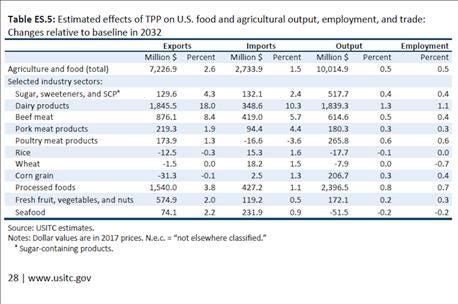
Wednesday the U.S. International Trade Commission released its report detailing the economic impact of the Trans-Pacific Partnership. The question now remains whether it provides enough incentive to move Congress to approve the measure, or if pundits will use the numbers against final passage.

The ITC stated that the TPP Agreement would increase U.S. exports and provide significant benefits for the U.S. agriculture sector, primarily through new market access in Japan, Vietnam, Malaysia, New Zealand, and Brunei—countries where the United States does not currently have free trade agreements. Under TPP, the Commission’s model estimates that by 2032, U.S. agricultural exports would be $7.2 billion higher than the baseline in the absence of TPP, while U.S. agricultural imports would be $2.7 billion higher than the baseline estimate.
If TPP is adopted, total U.S. agricultural output would rise by $10.0 billion (0.5%) by 2032, relative to the baseline; this would be associated with 0.5% higher U.S. agricultural employment.
In 2015, 10% of U.S. beef production, 20% of pork production and 16% of poultry production was exported to foreign markets, according to USDA.
While TPP will augment the competitiveness of U.S. meat and poultry exports across all countries represented in the agreement, meat and poultry exports to high-tariff, high-demand markets, like Japan and Vietnam, will benefit significantly, according to the North American Meat Institute.
The spin machine is already in action as the National Farmers Union and R-CALF, who both have been opposed to the trade deal, said the estimated 0.5% gain for U.S. exports isn’t enough.
A statement from the National Farmers Union explained that the TPP has been promoted by the Administration as a trade boon for agriculture that will break down trade barriers, but NFU president Roger Johnson pointed out that with TPP, agriculture does not stand to gain much with the rosiest of estimates. “Even agriculture, which is often touted as the most beneficially impacted sector of the economy, is only estimated to see a half percent gain over 15 years.”
Johnson added, “The commission’s assessment of a gain of just .15% in U.S. GDP in the next 16 years, while increasing our massive trade deficit should raise serious alarms about the proposed benefits of this trade agreement.” He stated that the USITC predicts TPP will increase the trade deficit by $21.7 billion.
The Farm Bureau’s analysis indicated farmers and ranchers would stand to gain $4.4 billion a year in added farm income with U.S. agricultural exports growing by $5.3 billion a year upon implementation of TPP. The ITC report suggests things could be even better, showing farm income up by $10 billion a year driven by net agricultural exports growing by $4.5 billion a year by 2032.
A statement from Secretary of Agriculture Tom Vilsack said the ITC report echoes that of others such as the Farm Bureau report and one from the Peterson Institute. “If we don’t act, not only will we lose these opportunities, we will be ceding our leadership in the region to China, allowing them to define the rules that the Pacific Rim plays by. We can’t afford to delay passage; there is simply too much at stake,” he said.
Every statement from mainstream commodity groups was quick to point out the need to act now and urged Congress to move ahead on ratifying the agreement.
“Every day we wait to approve TPP, we fall further behind our global competitors,” said Zippy Duvall, president of the American Farm Bureau Federation.
“USITC’s report reveals that the U.S. cannot sit idly by while other TPP countries negotiate bilateral and regional free trade agreements that would place American exports, including meat and poultry exports, at a competitive disadvantage,” said NAMI president and chief executive officer Barry Carpenter. “Failure to ratify TPP will result in lost market share for U.S. meat exports, and undermines the long-term position of the U.S. meat and poultry industry, which relies on identifying new markets and consumers.”
National Pork Producers Council expressed concern about a U.S. delay in approving – or even a rejection of – the trade agreement, pointing out that other countries are negotiating free trade deals in the Asia-Pacific region, including the China-led, 16-nation Regional Comprehensive Economic Partnership.
“The U.S. needs to act more quickly to get the TPP approved and implemented,” said NPPC president John Weber. “If we delay, we fall behind. And we certainly cannot afford either economically or geopolitically to walk away from the fastest growing region in the world.”
“We understand that the political environment is difficult in an election year, but that’s the job lawmakers signed on to do. TPP deserves a debate and a vote so these benefits can be realized,” said Richard Wilkins, president of the American Soybean Assn.
Read more how likely a deal is this year by reading my blog, TPP in lame duck uphill challenge.
About the Author(s)
You May Also Like






